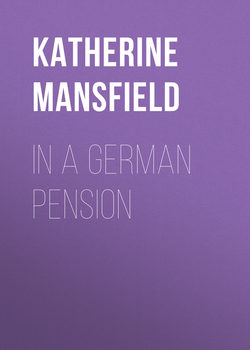Читать книгу In a German Pension - Katherine Mansfield, Katherine Mansfield - Страница 5
5. FRAU BRECHENMACHER ATTENDS A WEDDING
ОглавлениеGetting ready was a terrible business. After supper Frau Brechenmacher packed four of the five babies to bed, allowing Rosa to stay with her and help to polish the buttons of Herr Brechenmacher’s uniform. Then she ran over his best shirt with a hot iron, polished his boots, and put a stitch or two into his black satin necktie.
“Rosa,” she said, “fetch my dress and hang it in front of the stove to get the creases out. Now, mind, you must look after the children and not sit up later than half-past eight, and not touch the lamp—you know what will happen if you do.”
“Yes, Mamma,” said Rosa, who was nine and felt old enough to manage a thousand lamps. “But let me stay up—the ‘Bub’ may wake and want some milk.”
“Half-past eight!” said the Frau. “I’ll make the father tell you too.”
Rosa drew down the corners of her mouth.
“But… but…”
“Here comes the father. You go into the bedroom and fetch my blue silk handkerchief. You can wear my black shawl while I’m out—there now!”
Rosa dragged it off her mother’s shoulders and wound it carefully round her own, tying the two ends in a knot at the back. After all, she reflected, if she had to go to bed at half past eight she would keep the shawl on. Which resolution comforted her absolutely.
“Now, then, where are my clothes?” cried Herr Brechenmacher, hanging his empty letter-bag behind the door and stamping the snow out of his boots. “Nothing ready, of course, and everybody at the wedding by this time. I heard the music as I passed. What are you doing? You’re not dressed. You can’t go like that.”
“Here they are—all ready for you on the table, and some warm water in the tin basin. Dip your head in. Rosa, give your father the towel. Everything ready except the trousers. I haven’t had time to shorten them. You must tuck the ends into your boots until we get there.”
“Nu,” said the Herr, “there isn’t room to turn. I want the light. You go and dress in the passage.”
Dressing in the dark was nothing to Frau Brechenmacher. She hooked her skirt and bodice, fastened her handkerchief round her neck with a beautiful brooch that had four medals to the Virgin dangling from it, and then drew on her cloak and hood.
“Here, come and fasten this buckle,” called Herr Brechenmacher. He stood in the kitchen puffing himself out, the buttons on his blue uniform shining with an enthusiasm which nothing but official buttons could possibly possess. “How do I look?”
“Wonderful,” replied the little Frau, straining at the waist buckle and giving him a little pull here, a little tug there. “Rosa, come and look at your father.”
Herr Brechenmacher strode up and down the kitchen, was helped on with his coat, then waited while the Frau lighted the lantern.
“Now, then—finished at last! Come along.”
“The lamp, Rosa,” warned the Frau, slamming the front door behind them.
Snow had not fallen all day; the frozen ground was slippery as an icepond. She had not been out of the house for weeks past, and the day had so flurried her that she felt muddled and stupid—felt that Rosa had pushed her out of the house and her man was running away from her.
“Wait, wait!” she cried.
“No. I’ll get my feet damp—you hurry.”
It was easier when they came into the village. There were fences to cling to, and leading from the railway station to the Gasthaus a little path of cinders had been strewn for the benefit of the wedding guests.
The Gasthaus was very festive. Lights shone out from every window, wreaths of fir twigs hung from the ledges. Branches decorated the front doors, which swung open, and in the hall the landlord voiced his superiority by bullying the waitresses, who ran about continually with glasses of beer, trays of cups and saucers, and bottles of wine.
“Up the stairs—up the stairs!” boomed the landlord. “Leave your coats on the landing.”
Herr Brechenmacher, completely overawed by this grand manner, so far forgot his rights as a husband as to beg his wife’s pardon for jostling her against the banisters in his efforts to get ahead of everybody else.
Herr Brechenmacher’s colleagues greeted him with acclamation as he entered the door of the Festsaal, and the Frau straightened her brooch and folded her hands, assuming the air of dignity becoming to the wife of a postman and the mother of five children. Beautiful indeed was the Festsaal. Three long tables were grouped at one end, the remainder of the floor space cleared for dancing. Oil lamps, hanging from the ceiling, shed a warm, bright light on the walls decorated with paper flowers and garlands; shed a warmer, brighter light on the red faces of the guests in their best clothes.
At the head of the centre table sat the bride and bridegroom, she in a white dress trimmed with stripes and bows of coloured ribbon, giving her the appearance of an iced cake all ready to be cut and served in neat little pieces to the bridegroom beside her, who wore a suit of white clothes much too large for him and a white silk tie that rose halfway up his collar. Grouped about them, with a fine regard for dignity and precedence, sat their parents and relations; and perched on a stool at the bride’s right hand a little girl in a crumpled muslin dress with a wreath of forget-me-nots hanging over one ear. Everybody was laughing and talking, shaking hands, clinking glasses, stamping on the floor—a stench of beer and perspiration filled the air.
